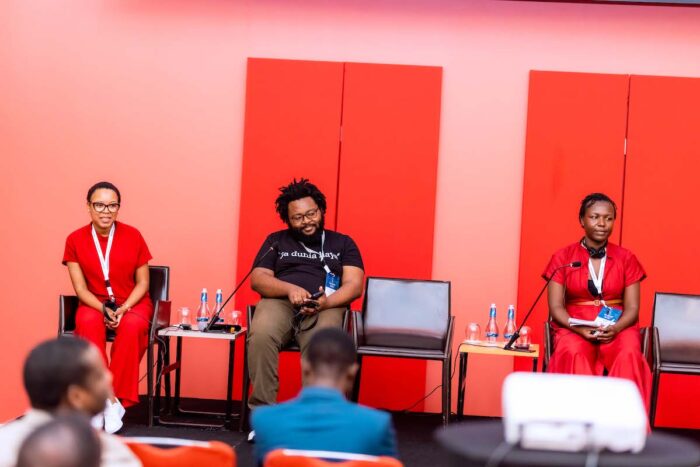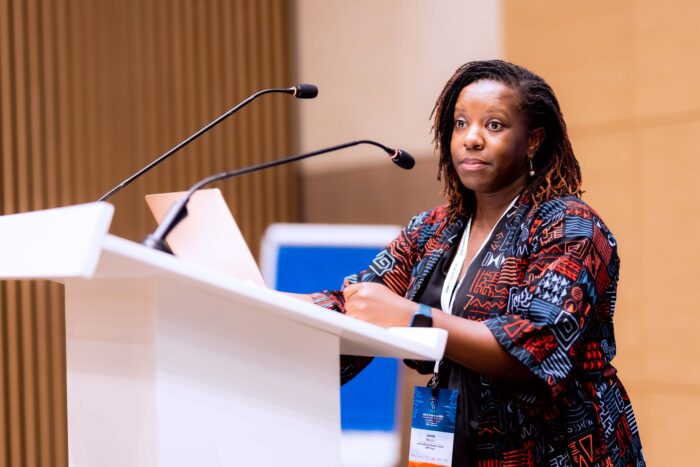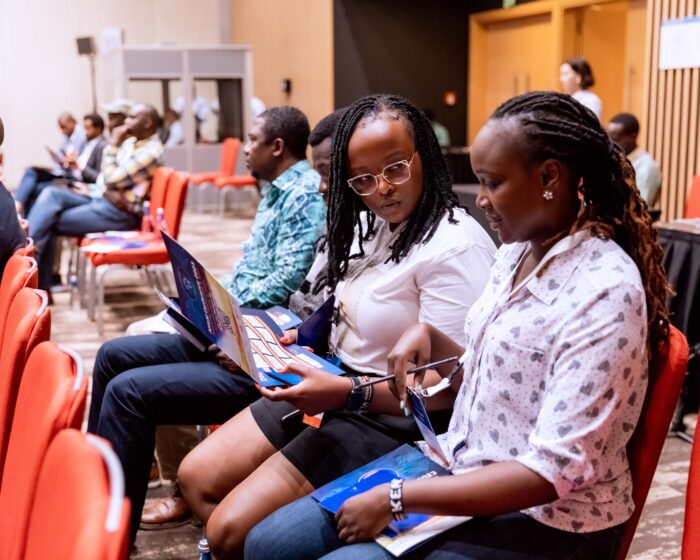The AfricAI Conference that took place in Kigali, Rwanda in June 2023 brought together professionals, experts, researchers, and policymakers from across the continent and beyond to explore the advancements and applications of artificial intelligence (AI) in various fields. Organised by the International Development and Research Center (IDRC), Deutsche Gesellschaft für Internationale Zusammenarbeit (GIZ) and Niyel, it served as a knowledge-sharing platform, fostering collaboration and networking within the AI community.
Renowned AI expert, Nnenna Nwakanma, delivered a powerful keynote address, emphasizing the significance of understanding the “why” behind AI development and the importance of responsible practices. In her address, she highlighted principles associated with responsible AI and urged participants to recognize the contributions of African pioneers in technology.
“We should remember where we come from as Africans. Our past is very important to us. We should not forget on whose shoulders we are standing today. If we are standing tall, we are standing on the shoulders of those who fought for open AI.”
Nnenna Nwakanma
Nnenna stressed the need for self-reliance, accountability, and responsible leadership to envision a future where Africa’s potential in AI is fully unlocked.
The AfricAI Conference stood as a crucial event for the AI community, uniting stakeholders to discuss the potential of artificial intelligence in various sectors. The conference’s workshops and presentations covered diverse topics, fostering discussions on AI research, adoption, skills, governance, and policy, ultimately contributing to the growth of AI in Africa.
Through a series of articles, we will provide a recap of the conference by focusing on the themes that the workshops and presentations could be classified under, that is – AI Research and Applications, AI Adoption and Commercialisation, AI Skills and AI Governance and Policy.
In this first part, we will share a summary of the presentations and workshops under AI Research and Applications
AI Research and Applications
The field of Artificial Intelligence (AI) has witnessed remarkable advancements over the years, but its impact can be limited when it comes to languages that are under-resourced, particularly in the African context. However, recent presentations under AI Research have shed light on locally led efforts to overcome this challenge.
NLP for Low-Resource Language Workshop:
The NLP for low-resource language workshop led by Natural Language Processing researchers at Maseno University highlighted the importance of supporting under-resourced languages for NLP tasks. Swahili and its dialects, as an example of a low-resource language, were discussed, underlining the challenges faced in leveraging technology for its development. The session leads presented a project that involved collaboration between linguists and computer science experts to collect and create data for NLP applications, emphasizing the importance of accurate data for training language models. Challenges such as resource inequalities and inaccuracies in existing platforms were acknowledged. To tackle these hurdles, attendees explored innovative approaches that could be adapted for other low-resource languages in Africa and identified the potential of pre-trained large language models to benefit these languages.
Lacuna Workshop:
The Lacuna Workshop showcased the pressing need to bridge the data gap in various domains, including agriculture. A total of 9 speakers were invited to deliver presentations focused on new machine-learning datasets in agriculture and advancements in natural language processing for African languages. Presentations highlighted projects that utilised smartphone pictures for crop monitoring in smallholder systems and sensor-based aquaponics fishpond datasets for water management. These initiatives emphasised the importance of creating accessible and usable datasets, as well as the impact of AI in addressing development challenges across the continent.
Improving the Digital Footprint of African Languages:
The session was opened by Kathleen Siminyu and facilitated by members of the Masakhane team. It discussed language technologies worldwide, the gap between African and Western languages, and the efforts of Masakhane in creating datasets and models for African languages. Challenges like scarcity of linguistic resources, data collection difficulties, and limited access to resources and funding were discussed. To overcome these obstacles, strategies such as collaboration with organizations, online dataset collection, and community-driven efforts were proposed. Engaging sponsors and businesses to support language technology development was also highlighted as a potential solution.
Africa Mradi: Using Mozilla Common Voice to Connect Training Data for Different Use Cases:
This session, led by the Mozilla Foundation, focused on the importance of AI in creating usable voice technology for machines and voice systems. The team discussed the Mozilla platform and its applications in developing voice technology. They encouraged individuals to contribute voice data to train AI models and improve voice systems. Different aspects of the platform, such as building training data, adding new languages, and addressing gender challenges in voice technology, were presented.

In conclusion, the presentations under AI Research showcased the immense potential of AI in advancing African languages. By focusing on NLP for under-resourced languages and creating datasets for language processing and agriculture, researchers are taking significant steps to bridge the data gap and provide better support for language-related tasks. These efforts highlight the importance of collaboration, community engagement, and accessible data in promoting language technology development, empowering African communities, and fostering cultural ownership in an era of globalization.
AI Applications
Artificial Intelligence (AI) has emerged as a powerful tool with transformative potential in addressing various challenges across different sectors. In Africa, the application of AI is gaining momentum as a means to achieve sustainable development goals. During the conference, sessions on AI applications in Africa highlighted practical use cases of AI in agriculture, climate action, healthcare, and maternal and reproductive health. These initiatives demonstrated the potential of AI to drive positive change and improve livelihoods in the region.
AI in Agriculture: Participatory Approaches to Building an AI Early Warning System for Maize in Kenya
One of the key areas where AI is making a significant impact is agriculture. Smallholder farmers often face challenges related to climate change, resource management, and market access. The Local Development Research Institute (LDRI) showcased an AI project that uses computer vision and satellite data to predict optimal crop growth conditions and provide data-driven recommendations to smallholder farmers. By optimizing various aspects of crop growth, such as fertilizer and pesticide use, water and nutrition optimization, and crop formation, the project aims to increase local incomes in the maize value chain. Collaborating with county governments and private sector stakeholders, the LDRI ensures the adoption of AI solutions among smallholder farmers

Responsible AI in Agriculture: Ethical Considerations and Inclusivity
The Responsible Artificial Intelligence Lab (RAIL) emphasized the importance of responsible AI practices in agriculture, especially in smallholder farming. The panel discussion discussed interventions such as pest detection tools in rice fields and AI models for addressing crop damage in Senegal. It highlighted the significance of gender-aware AI algorithms, diverse research teams, and pro-gender policies to ensure equity in AI applications. Stakeholder engagement and collaboration were underscored to create impactful digital innovations in smallholder farming.
AI for Food Security: Leveraging Data and Open Models
The African Technology Policy Studies Network (ATPS) showcased the AI for Food Security Innovation program, aiming to address food security challenges in Africa using AI. Ten grantees presented their work, focusing on AI tools for crop disease detection, pest monitoring, climate information services, soil moisture monitoring, yield forecasting, and crop illness detection. The program advocates for responsible AI principles, open data, and gender inclusion to achieve sustainable development and climate adaptation in agriculture.
AI for Climate Action: Mitigating and Adapting to Climate Change
The workshop on AI for Climate Action emphasized the use of AI to mitigate and adapt to climate change, with a focus on the Climate Change AI initiative. The discussions highlighted the importance of interpreting AI models, promoting equity and climate justice, and engaging diverse stakeholders in AI-driven climate action. Participants proposed innovative AI solutions, such as weather prediction models, early warning systems for farmers, and crop advice tools, to mitigate the impact of climate change on agriculture.
AI in Healthcare: Addressing Low-Resource Settings
The sessions on AI in healthcare shed light on the potential of AI to improve disease detection, diagnosis, and treatment in low-resource settings. Presentations from Makerere University showcased AI models for detecting health conditions such as pneumonia, tuberculosis, and malaria. The use of chatbots facilitated data collection and health education in rural and urban areas. Challenges discussed included limited healthcare infrastructure, data privacy concerns, and the need for human involvement in AI systems.
Developing Artificial Intelligence (AI) Tools in Africa: Success and Challenges
This informative session was run by MinoHealth AI Labs and Villgro Africa. Darlington Akogo, Founder and CEO of MinoHealth AI Labs, talked about the use of AI for radiology, infectious diseases, and biomedical research in order to detect diseases early, improve life expectancy and increase survival rates in Africa. Healthcare in Africa faces serious challenges like insufficient infrastructure, lack of funding for beds and physicians, and shortage of radiologists but through AI, MinoHealth AI Labs hopes to improve on the capabilities of healthcare professionals and democratize early disease detection.

Conclusion
In all the AI applications discussed, ethical considerations were a common thread. Responsible AI practices, inclusivity, transparency, fairness, and safety were emphasized to ensure equitable and impactful outcomes. Stakeholder collaboration, partnerships, and engaging end-users, subject matter experts, and affected communities were identified as crucial for successful AI development and implementation.
AI in agriculture offers opportunities to optimize crop growth and improve smallholder livelihoods. In healthcare, AI can enhance disease detection and diagnosis, particularly in low-resource settings. Responsible AI practices and ethical considerations are paramount in promoting equity and inclusivity in AI applications. Collaborative efforts among academia, industry, governments, and civil society organizations are essential to harness the full potential of AI for sustainable development in Africa. Through responsible AI practices and inclusive approaches, the continent can unlock AI’s transformative power to drive positive change and improve the lives of its people.